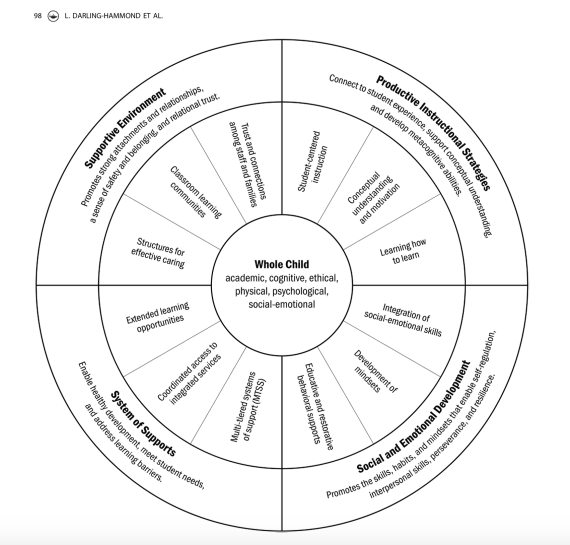
by Jo Boaler | youcubed at Stanford University
I know that you sometimes appreciate me sharing important research so today I am highlighting a really important article by Linda Darling-Hammond and colleagues. I love this article as it so carefully and clearly summarizes research on learning to address all the different dimensions of schooling that are important. It is a long-ish article so I am sharing a summary here, but I do recommend you read it all, especially the sections on conceptual teaching (pages 115-118). The article shares the ways we can create school and classroom environments that support children’s well-being, development, and learning.
The citation is: Linda Darling-Hammond, Lisa Flook, Channa Cook-Harvey, Brigid Barron & David Osher (2020) Implications for educational practice of the science of learning and development, Applied Developmental Science, 24:2, 97-140, doi.org/10.1080/10888691.2018.1537791
The paper includes these sections:
Building Supportive Environments. Schools should foster strong relationships and a sense of community, with classrooms that are safe, personalized, and culturally responsive, and trusting relationships between students, and families.
Conceptual Approaches to Mathematics. Classrooms should use teaching approaches that focus on big ideas, teaching students’ conceptually, and that build on students’ prior knowledge and experiences. Metacognitive strategies - teaching students how to learn should be a part of mathematics teaching.
Social and Emotional Learning. Schools should teach social, emotional, and cognitive skills, building growth mindsets, promoting resilience and self-direction, using educative and restorative behavior supports.
System of Supports. Schools need to have a multi-tiered system of supports to address individual needs including integrated services (eg health, mental health, social services) and extended learning opportunities (eg after-school programs, & summer learning).
The paper calls for rethinking traditional educational models and implementing practices that are informed by scientific research on the ways children learn and develop.
The graphic (right) summarizes the different ideas.